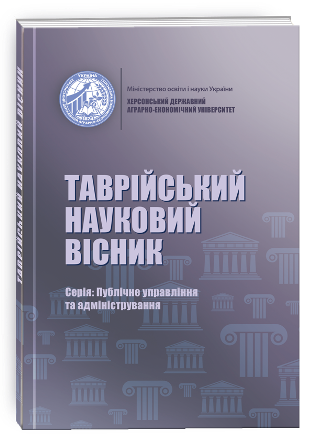INSTITUTE OF PARLIAMENTARISM IN UKRAINE: FORMATION, PROBLEMS AND PROSPECTS OF DEVELOPMENT
DOI:
https://doi.org/10.32782/tnv-pub.2024.4.3Keywords:
institution of parliamentarism, Verkhovna Rada of Ukraine, democracy, state administration, electoral system, political reforms, parliamentary control, legislative activity, transparency, accountability, oligarchic influence, political stability, democratic processesAbstract
The institution of parliamentarism is one of the main elements of democratic governance, ensuring the representation of citizens' interests and the implementation of the principles of power distribution. It acts as an important mechanism in creating an efficient and responsible system of public administration, where the parliament acts as an arbiter between different branches of government, promoting balance and interaction. The formation of parliamentarism in Ukraine went through a complex and multifaceted path, starting from the times of Kyivan Rus, when the basis of governance was the centuries-old assemblies, through the development of the Cossack statehood with its democratic principles of self-government, to the creation of the Ukrainian People's Republic (UNR) at the beginning of the 20th century, which became the first modern an example of parliamentary democracy on Ukrainian territory. After the restoration of independence in 1991, the institution of parliamentarism began to acquire new features, facing the challenges of the transformation period. In the conditions of political instability and constant transformations, the role of the parliament in Ukraine has become key in ensuring transparency, accountability of the executive power and support of democratic principles. The Verkhovna Rada of Ukraine, as the only legislative body, performs fundamental functions in the formation of state policy, approval of laws and control over their implementation. However, the Ukrainian parliament faces numerous problems that inhibit its effectiveness. Among such problems are the lack of stable parliamentary traditions, political structures inherited from the Soviet period that limit the independence of the legislative branch of government, and the influence of oligarchic groups that largely determine the country's political landscape. One of the biggest challenges for modern Ukrainian parliamentarism is the implementation of democratic reforms in the context of ongoing martial law. Growing security and stability challenges require rapid adaptation of the legislative body to new realities. The imperfection of the electoral system, which often does not take into account the interests of broad sections of the population, as well as the ineffectiveness of the law-making process, have become critical factors that require immediate resolution. There is also the need to increase the role of parliamentary hearings and committees in supervising the executive power. The article highlights a number of ways to improve the institution of parliamentarism in Ukraine. Among the proposed directions is the reform of the legislative framework aimed at ensuring greater transparency in decision-making and increasing the responsibility of deputies for their actions. Special attention is paid to the improvement of the electoral system, which will allow to create mechanisms that will better reflect the interests of society and promote the development of political competition. It is also important to create new mechanisms for monitoring government activities, including more effective use of parliamentary requests, parliamentary committees and audits. The study proposes to use the experience of foreign countries that have gone through similar stages of development of parliamentarism. Positive practices of countries with stable democratic traditions are analyzed, such as the expansion of inter-party dialogue, cooperation between the legislative and executive branches of government, as well as effective models of parliamentary control. Adapting these models to Ukrainian realities will help strengthen parliamentary oversight and make political processes more transparent and accountable. The results of the study can become an important contribution to the scientific understanding of the role of parliamentarism in modern conditions. They can be used for further analysis and development of the theory and practice of parliamentarism in Ukraine, which will contribute to more efficient functioning of state institutions and strengthening of democratic processes.
References
Парламентаризм : підручник / В. А. Гошовська та ін. Київ : НАДУ, 2016. 672 с.
Шаповал В. М. Сучасний конституціоналізм : монографія. Київ : Юридична фірма «Салком» ; Юрінком Інтер, 2005. 560 с.
Strom K. Minority Government and Majority Rule. Cambridge : Cambridge University, 1990. 293 p.
Кислий П., Вайз Ч. Становлення парламентаризму в Україні: На тлі світового досвіду / літ. ред. Е.Р.Рахімкулов. Київ : Абріс, 2000. 414 с.
Георгіца А. З. Сучасний парламентаризм: проблеми теорії і практики. Чернівці : Рута, 1998. 484 с.
Древаль Ю. Парламентаризм «приглушений» чи раціональний? Віче. 2003. № 9. С. 50–53.
Журавський В. С. Становлення і розвиток українського парламентаризму (теоретичні та організаційно-правові проблеми). Київ : Парламентське вид-во, 2002. 344 с.
Заяць Н. В. Народне представництво: сутність, суб’єкти та особливості здійснення в Україні: монографія. Луцьк : ПрАТ «Волинська обласна друкарня», 2012. 300 с.
Копиленко О., Мурашин Г. Деякі методологічні аспекти наукового забезпечення законодавчого процесу. Вісник Академії правових наук України. 2003. № 2(23) – 3(33). С. 132–142.
Шемшученко Ю. С. Теоретична засади розвитку українського парламентаризму. Право України. 2008. № 1. С. 17–20.







